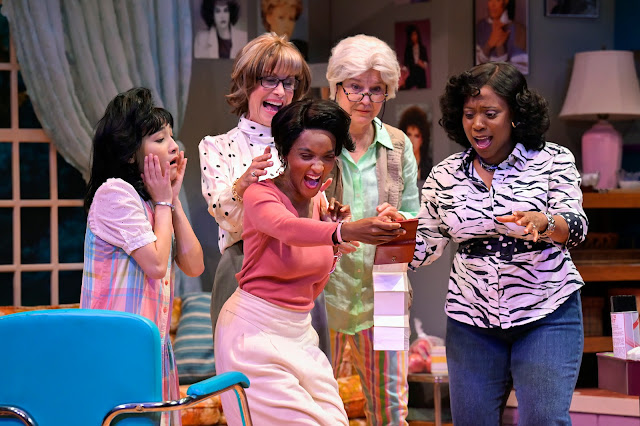 |
| Shelby (Jasmine Milan Williams, center) shows pictures of her baby to (from left) Annelle (Alexandra Lee), Clairee (Marcia Pizzo), Ouiser (Nancy Carlin) and Truvy (Lisa Strum). Kevin Berne photo |
Harling didn’t intend to write a play. He just wanted to write something for his nephew to know more about Harling’s sister, the boy’s mother.
Afflicted with diabetes, she defied medical advice by having a baby and thereby overtaxing her body. Her kidneys failed.
She went on dialysis until she received a kidney transplant from her mother, but it failed. She died when the boy was 2 years old.
Taking on a life of their own, Harling’s recollections evolved into a play set in a beauty shop. Every Saturday morning six women gather there to get their hair done, exchange recipes and talk, mostly about themselves and their families.
Covering about 2 ½ years, the play shows how these
women cope and get on with their lives.
Earlier productions, including the one that
TheatreWorks staged at the Burgess Theater in Menlo Park in 1991, have featured
an all-white cast. However, director Elizabeth Carter has selected a
multi-racial cast of white, Black and Asian women.
Their ethnicity doesn’t matter. Their warm camaraderie
and caring do.
The shop is wedged between the patio and garage at
the home of Truvy (Lisa Strum), the owner.
Her regular customers include M’Lynn (Dawn L.
Troupe); her daughter, Shelby (Jasmine Milan Williams); and two neighbors,
Clairee (Marcia Pizzo) and Ouiser (Nancy Carlin).
In addition, Truvy has just hired Annelle (Alexandra
Lee), a young newcomer to the town.
As the play opens, Shelby and M’Lynn are having
their hair done for Shelby’s wedding that afternoon. Clairee, widow of the
town’s recently deceased mayor, and the eccentric, curmudgeonly Ouiser arrive
for their appointments.
In a later scene, Shelby announces that she’s
pregnant, much to her mother’s dismay. When the baby arrives, it’s three months
premature but survives.
In the meantime, Clairee has found new interests,
including travel, theater and a male friend. She also has bought the local radio
station. Ouiser, too, has started seeing an old boyfriend.
As the play proceeds, it becomes more serious, but
it’s offset by the friendly banter, warmth and humor throughout the action.
Harling has a keen ear for Southern speech and
hilarious comments. For example, Shelby loves pink and has used it for
everything in her wedding, including the church. Her mother says the church
looks like it has been sprayed with Pepto-Bismol.
Although the action opens in 1986, some moments are
familiar today. For example, a local fundamentalist preacher objects to calling
the town’s high school sports teams the Devils because it encourages Satanism.
Carter does a superb job of directing this ensemble
cast while each actor creates a believable, very human character.
Adding to the play’s enjoyment is the detailed set
by Andrea Bechert with lighting by Steven B. Mannshardt, costumes by Dana
Rebecca Woods and sound by Christopher Sauceda.
The production’s only drawback is that some of the
Southern accents are difficult to understand.
Otherwise, this is a highly entertaining play that
captures the importance of friendship in women’s lives.
Running about 2 ½ hours with one intermission, it
will continue through July 2 at the Mountain View Center for the Performing
Arts, 500 Castro St., Mountain View.
For tickets and information, call (877) 662-8978 or
visit www.theatreworks.org.
No comments:
Post a Comment
Note: Only a member of this blog may post a comment.